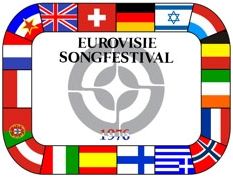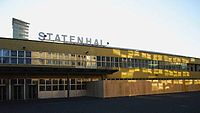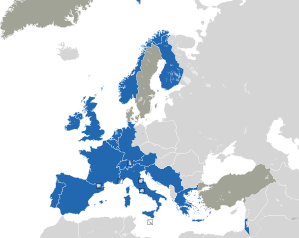Eurovision Song Contest 1976
| Eurovision Song Contest 1976 | |
|---|---|
 | |
| Dates | |
| Final | 3 April 1976 |
| Host | |
| Venue | Nederlands Congresgebouw The Hague, Netherlands |
| Presenter(s) | Corry Brokken |
| Director | Theo Ordeman |
| Musical director | Jan Stulen |
| Executive supervisor | Clifford Brown |
| Host broadcaster | Nederlandse Omroep Stichting (NOS) |
| Website | eurovision |
| Participants | |
| Number of entries | 18 |
| Debuting countries | None |
| Returning countries | |
| Non-returning countries | |
| |
| Vote | |
| Voting system | Each country awarded 12, 10, 8-1 points to their 10 favourite songs |
| Winning song | "Save Your Kisses for Me" |
The Eurovision Song Contest 1976 was the 21st edition of the Eurovision Song Contest. It was hosted by NOS and held in The Hague, Netherlands. The arena for the event was the Nederlands Congrescentrum. Teach-In's victory in Stockholm the previous year gave The Netherlands the right to host the contest for the third time. The Contest was won by Brotherhood of Man, who sang "Save Your Kisses for Me" in English, representing the United Kingdom.[1]
Location

The Hague is the seat of government of the Kingdom of the Netherlands and the capital city of the province of South Holland. It is also the third largest city of the Netherlands, after Amsterdam and Rotterdam. Located in the west of the Netherlands, The Hague is in the centre of the Haaglanden conurbation and lies at the southwest corner of the larger Randstad conurbation. The contest took place at the Congresgebouw (presently known as the World Forum). The venue was constructed in 1969.
Format
The scoring system introduced in the previous year's competition returned in 1976. Each jury gave 12 points to the best song, 10 to the second best, then 8 to the third, and then 7 to 1 (from fourth to tenth best song, according to the jury). Unlike today, the points were not given in order (from 1 up to 12), but in the order the songs were performed. The current procedure was not established until 1980.
Participating countries
Sweden, Malta and Turkey did not enter after their participation the year prior, while Austria and Greece returned to the contest, making for eighteen participating countries.[1]
Sweden did not enter in the contest, as broadcaster Sveriges Radio (SR) did not have enough money to host another contest if Sweden won again. A new rule was therefore introduced that in the future each broadcaster participating would have to pay a part of the cost of staging the contest. As the author and historian John Kennedy O'Connor notes in his book The Eurovision Song Contest – The Official History, there had been public demonstrations in Sweden against the contest, which also played a part in SR's decision not to take part.[2] The same book also notes that the victorious song went on to become the biggest selling winning single in the history of the contest and won with 80.39% of the possible maximum score and an average of 9.65 of 12; a record under the voting system introduced in 1975.[3]
Liechtenstein attempted to submit an entry to the contest, but as they had no broadcasting service of their own, they were not allowed to. Their entry would have been "Little Cowboy" by Biggi Bachmann.[4][5]
Conductors
Each performance had a conductor who conducted the orchestra.[6][7]
 United Kingdom – Alyn Ainsworth
United Kingdom – Alyn Ainsworth Switzerland – Mario Robbiani
Switzerland – Mario Robbiani Germany – Les Humphries
Germany – Les Humphries Israel – Matti Caspi
Israel – Matti Caspi Luxembourg – Jo Plée
Luxembourg – Jo Plée Belgium – Michel Bernholc
Belgium – Michel Bernholc Ireland – Noel Kelehan
Ireland – Noel Kelehan Netherlands – Harry van Hoof
Netherlands – Harry van Hoof Norway – Frode Thingnæs
Norway – Frode Thingnæs Greece – Michalis Rozakis
Greece – Michalis Rozakis Finland – Ossi Runne
Finland – Ossi Runne Spain – Joan Barcons
Spain – Joan Barcons Italy – Maurizio Fabrizio
Italy – Maurizio Fabrizio Austria – Erich Kleinschuster
Austria – Erich Kleinschuster Portugal – Thilo Krasmann
Portugal – Thilo Krasmann Monaco – Raymond Donnez
Monaco – Raymond Donnez France – Tony Rallo
France – Tony Rallo Yugoslavia – Esad Arnautalić
Yugoslavia – Esad Arnautalić
Returning artists
Four artists returned to the contest in 1976. Fredi who represented Finland in 1967, Sandra Reemer returned having represented Netherlands in 1972, Peter, Sue and Marc also returned having represented Switzerland in 1971, and finally Anne-Karine Strøm represented Norway again having last done so in 1974; she repeated her finishing result by coming last once more.
Results
The following tables reflect the officially verified scores given by each jury, adjusted after the transmission. During the live broadcast, France failed to announce the 4 points they awarded to Yugoslavia, an error overlooked by the scrutineer, Clifford Brown. Thus in the live show, Norway were placed 17th and Yugoslavia 18th. After the broadcast, the scores were adjusted and the two nations swapped places, with Yugoslavia's score being adjusted from 6 to 10 points, moving Norway down to last place.
In terms of points gained as a percentage of maximum available, the winning UK entry from Brotherhood of Man is statistically the most successful winning Eurovision entry since the introduction of the 'douze points' scoring system inaugurated in 1975 [N 1]
Notes
- ^ As noted on a TOTP2 Eurovision special, the 1997 Katrina and the Waves entry Love Shine a light ranks third in the rankings of points achieved as a percentage of maximum available with 227 out of 288 or 78.81%, behind Nicole's "Ein bißchen Frieden" in 1982 (161 out of 204 or 78.92%) and Brotherhood of Man's "Save Your Kisses for Me" in 1976 (164 out of 204 or 80.39%). For comparison, Elena Paparizou's 2005 win took 230 points out of a possible 456, or only 50.04% while Portugal's dominant 2017 win from Salvador Sobral took 758 points from a possible 984 available, equating to 77.04%.
Scoreboard
| Results | ||||||||||||||||||||
|---|---|---|---|---|---|---|---|---|---|---|---|---|---|---|---|---|---|---|---|---|
Total score
|
United Kingdom
|
Switzerland
|
Germany
|
Israel
|
Luxembourg
|
Belgium
|
Ireland
|
Netherlands
|
Norway
|
Greece
|
Finland
|
Spain
|
Italy
|
Austria
|
Portugal
|
Monaco
|
France
|
Yugoslavia
| ||
Contestants
|
United Kingdom | 164 | 12 | 8 | 12 | 8 | 12 | 3 | 10 | 12 | 12 | 10 | 12 | 4 | 10 | 12 | 10 | 7 | 10 | |
| Switzerland | 91 | 12 | 5 | 4 | 1 | 7 | 1 | 6 | 10 | 2 | 7 | 4 | 8 | 7 | 4 | 6 | 7 | |||
| Germany | 12 | 2 | 2 | 1 | 2 | 2 | 3 | |||||||||||||
| Israel | 77 | 6 | 7 | 3 | 7 | 5 | 4 | 2 | 7 | 8 | 1 | 10 | 6 | 2 | 1 | 8 | ||||
| Luxembourg | 17 | 6 | 6 | 5 | ||||||||||||||||
| Belgium | 68 | 7 | 6 | 1 | 4 | 6 | 12 | 8 | 3 | 8 | 8 | 5 | ||||||||
| Ireland | 54 | 10 | 1 | 3 | 3 | 8 | 5 | 12 | 2 | 6 | 3 | 1 | ||||||||
| Netherlands | 56 | 4 | 4 | 8 | 4 | 4 | 2 | 1 | 7 | 3 | 2 | 4 | 6 | 2 | 5 | |||||
| Norway | 7 | 3 | 4 | |||||||||||||||||
| Greece | 20 | 2 | 4 | 5 | 1 | 8 | ||||||||||||||
| Finland | 44 | 2 | 6 | 6 | 5 | 1 | 4 | 6 | 7 | 7 | ||||||||||
| Spain | 11 | 3 | 1 | 3 | 3 | 1 | ||||||||||||||
| Italy | 69 | 1 | 8 | 2 | 12 | 3 | 10 | 6 | 1 | 10 | 10 | 6 | ||||||||
| Austria | 80 | 4 | 3 | 10 | 10 | 5 | 3 | 10 | 7 | 2 | 6 | 5 | 8 | 5 | 2 | |||||
| Portugal | 24 | 6 | 4 | 1 | 1 | 12 | ||||||||||||||
| Monaco | 93 | 5 | 5 | 7 | 7 | 12 | 8 | 8 | 8 | 5 | 2 | 7 | 7 | 5 | 3 | 4 | ||||
| France | 147 | 8 | 10 | 12 | 5 | 10 | 10 | 7 | 12 | 8 | 5 | 3 | 10 | 6 | 12 | 5 | 12 | 12 | ||
| Yugoslavia | 10 | 1 | 2 | 3 | 4 | |||||||||||||||
12 points
Below is a summary of all 12 points in the final:
| N. | Contestant | Voting nation |
|---|---|---|
| 7 | United Kingdom | Belgium, Greece, Israel, Norway, Portugal, Spain, Switzerland |
| 5 | France | Austria, Germany, Monaco, Netherlands, Yugoslavia |
| 1 | Belgium | Finland |
| Italy | Ireland | |
| Ireland | Italy | |
| Monaco | Luxembourg | |
| Portugal | France | |
| Switzerland | United Kingdom |
Broadcasters, commentators and spokespersons
Spokespersons
Listed below is the order in which votes were cast during the 1976 contest along with the spokesperson who was responsible for announcing the votes for their respective country.
 United Kingdom – Ray Moore[7]
United Kingdom – Ray Moore[7] Switzerland – Michel Stocker[9]
Switzerland – Michel Stocker[9] Germany – Hans-Joachim Scherbening
Germany – Hans-Joachim Scherbening Israel – Yitzhak Shim'oni[10]
Israel – Yitzhak Shim'oni[10] Luxembourg – Jacques Harvey
Luxembourg – Jacques Harvey Belgium – André Hagon
Belgium – André Hagon Ireland – Brendan Balfe[11]
Ireland – Brendan Balfe[11] Netherlands – Dick van Bommel
Netherlands – Dick van Bommel Norway – Sverre Christophersen[12]
Norway – Sverre Christophersen[12] Greece – Irini Gavala
Greece – Irini Gavala Finland – Erkki Vihtonen[13]
Finland – Erkki Vihtonen[13] Spain – José María Íñigo
Spain – José María Íñigo Italy – Rosanna Vaudetti
Italy – Rosanna Vaudetti Austria – Jenny Pippal
Austria – Jenny Pippal Portugal – Ana Zanatti[14]
Portugal – Ana Zanatti[14] Monaco – Carole Chabrier
Monaco – Carole Chabrier France – Marc Menant
France – Marc Menant Yugoslavia – Sandi Čolnik
Yugoslavia – Sandi Čolnik
Broadcasters and commentators
Each national broadcaster also sent a commentator to the contest, in order to provide coverage of the contest in their own native language.[1]
References
- ^ a b c "The Hague 1976 - Eurovision Song Contest". European Broadcasting Union. Retrieved 5 August 2020.
- ^ O'Connor, John Kennedy (2007). The Eurovision Song Contest: The Official History. UK: Carlton Books. pp. 64–67. ISBN 978-1-84442-994-3.
- ^ O'Connor, John Kennedy (2007). The Eurovision Song Contest: The Official History. UK: Carlton Books. ISBN 978-1-84442-994-3.
- ^ "No, No, Never!!! - Songs That Did Not Make It To Eurovision". eurovisionsongs.net. Archived from the original on 2009-03-01. Retrieved 2009-07-23.
- ^ "The Eurovision Song Contest 1956 – present". BBC. 2007-04-26. Retrieved 2009-07-23.
- ^ "And the conductor is..." Retrieved 4 August 2020.
- ^ a b c d e f g h i Roxburgh, Gordon (2014). Songs for Europe: The United Kingdom at the Eurovision Song Contest. Vol. Volume Two: The 1970s. Prestatyn: Telos Publishing. pp. 227–243. ISBN 978-1-84583-093-9.
{{cite book}}:|volume=has extra text (help) - ^ "Eurovision Song Contest 1976". The Diggiloo Thrush. Retrieved 15 August 2012.
- ^ Baumann, Peter Ramón (OGAE Switzerland)
- ^ "פורום אירוויזיון". Sf.tapuz.co.il. 1999-09-13. Archived from the original on October 8, 2011. Retrieved 2012-08-10.
- ^ a b c d e f g h i j k l m n o "Eurovision 1976 - Cast and Crew". IMDb. Retrieved 4 August 2020.
- ^ a b Dyrseth, Seppo (OGAE Norway)
- ^ "Selostajat ja taustalaulajat läpi vuosien? • Viisukuppila". Viisukuppila.fi. Retrieved 2012-08-10.
- ^ "Comentadores Do ESC – escportugalforum.pt.vu | o forum eurovisivo português". 21595.activeboard.com. Archived from the original on April 21, 2012. Retrieved 2012-08-10.
- ^ "Concours Eurovision de la Chanson • Consulter le sujet – Commentateurs des pays francophones". Eurovision.vosforums.com. Retrieved 2012-08-10.
- ^ Adriaens, Manu & Loeckx-Van Cauwenberge, Joken. Blijven kiken!. Lannoo, Belgium. 2003 ISBN 90-209-5274-9
- ^ "Selostajat ja taustalaulajat läpi vuosien? • Viisukuppila". Viisukuppila.fi. Retrieved 2012-08-10.
- ^ a b "Au Grand Prix Eurovision de la Chanson". Radio TV - Je vois tout. Lausanne, Switzerland: Le Radio SA. 1 April 1976.
- ^ Christian Masson. "1976 – La Haye". Songcontest.free.fr. Retrieved 2012-08-10.
- ^ "Eurovision Song Contest 1976". Ecgermany.de. Retrieved 2012-08-10.
- ^ "Η Μακώ Γεωργιάδου και η EUROVISION (1970–1986)". Retromaniax.gr. Archived from the original on 2012-05-30. Retrieved 2012-08-10.
- ^ "Nederlandse televisiecommentatoren bij het Eurovisie Songfestival". Eurovision Artists (in Dutch).
- ^ RadioVisie.eu (1976-04-17). "RetroVisie: april 1976 [ RadioVisie.eu /nl /actueel ]". Radiovisie.eu. Retrieved 2012-08-10.
- ^ "Hvem kommenterte før Jostein Pedersen? - Debattforum". Nrk.no. Archived from the original on November 2, 2012. Retrieved 2012-08-10.
- ^ "FORO FESTIVAL DE EUROVISIÓN • Ver Tema – Uribarri comentarista Eurovision 2010". Eurosongcontest.phpbb3.es. Archived from the original on 2012-03-17. Retrieved 2012-08-10.
- ^ "Grand Final: 1976, 1976, Eurovision Song Contest". BBC.
- ^ Háskólabókasafn, Landsbókasafn Íslands -. "Timarit.is". timarit.is.
- ^ "Infosajten.com". Infosajten.com. Archived from the original on July 18, 2012. Retrieved 2012-08-10.

